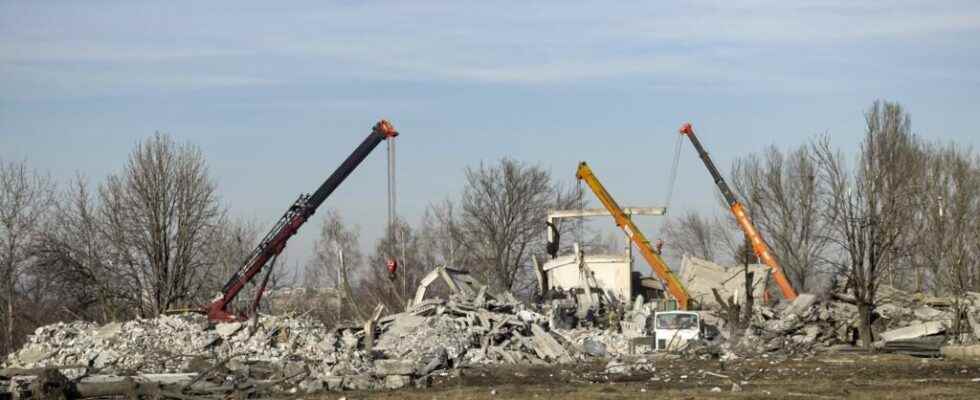The Ukrainian strike on Makeyevka on New Year’s Eve left 89 dead, Russia announced on Wednesday (January 4th), where rallies in memory of the soldiers killed gave rise to rare public demonstrations of anger and sadness.
The number of victims in the Russian ranks, initially estimated at 63, was revised upwards after the discovery of new bodies in the ruins of a building in Makeyevka, targeted by a Ukrainian strike on January 1 at 00:01 (22:01 UT), Russian General Sergey Sevryukov said in a video message released by the Russian Ministry of Defense.
The geolocation in question
” Currently, a commission is investigating the circumstances of the attack, he said. ” But it is already clear that the main cause (…) is the switching on and massive use by personnel of mobile phones within range of enemy weapons, contrary to the prohibition “, which would have made it possible to geolocate the troops, explained the general. This is the heaviest toll in a single attack admitted by Moscow since the start of the offensive in February.
This attack confirms the lack of training of these young mobilized people, and it confirms the failures of the Russian armed forces (…) These young people were obviously not supervised…
Anne de Tinguy, University Professor Emeritus at INALCO and researcher at CERI, author of “The Entangled Giant, Russia and the World from the End of the USSR to the Invasion of Ukraine” published by Perrin
Unusual in Russia, where the authorities remain discreet about military losses in Ukraine, around 200 people gathered with the approval of the authorities in Samara (center), where some of the soldiers killed were from, to mourn the dead. in an Orthodox ceremony.
The Ukrainian General Staff confirmed on Monday that it carried out the New Year’s Eve strike on the town east of the separatist city of Donetsk. The Ministry of Defense in Moscow reported the explosion of ” four missiles “. Russian President Vladimir Putin has yet to publicly react to the strike.
►Also read: The Russian economy is shifting towards a model of war economy
According to the Ministry of Defense, the missiles were fired by Himars systems, a weapon supplied by the United States to Ukrainian forces and which struck “ a temporary deployment center of the Russian army at Makeyevka.
Russian General Sergey Sevryukov claimed that his forces destroyed several Ukrainian missile launchers in Druzhkivka, Donetsk region, and killed 200 Ukrainians and foreign mercenaries after the attack on Makeyevka. Ukraine, for its part, reported one death and the destruction of an ice rink.
The strategic communications department of the Ukrainian armed forces meanwhile claimed that nearly 400 Russian soldiers were killed in Makeyevka.
The announcement of these heavy losses immediately provoked criticism in Russia towards the military command, accused in particular by the former separatist leader Igor Strelkov, very familiar with the situation on the ground, of having stored ammunition in this building not protected.
►Also read: Food aid parcels to the Russian army: the French group Bonduelle in turmoil
(with AFP)
Vladimir Putin demands the broadcast of documentaries on the “special military operation”
Vladimir Putin on Tuesday ordered cinemas to show documentaries devoted to the “special military operation” in Ukraine. A new stage in the controlled sectioning of the Russian cultural and media space.
Vladimir Poutine gave precise instructions: the ministry of Defense will have to offer its collaboration to the documentary filmmakers wishing to shoot films “ on the participants of the special operation who demonstrated valor, courage and heroism “. For its part, the Ministry of Culture is responsible for organizing a ” patriotic documentary festival “. And in collaboration with the Ministry of Education, to create ” public spaces, art installations and school museums telling the story of the heroes of the war in Ukraine, and organizing lessons about them in Russian schools.
A project which confirms two tendencies: that, on the one hand, of an unbridled politicization of school environments. And then on the other hand, the vacuum cleaning of the media and cultural field, entirely subject to the imperative of the militaristic and reactionary ideology promoted by the Kremlin.
There were already patriotic films, the only ones eligible for funding from the Ministry of Culture, lessons in patriotism and militarism at school, independent media banned from Russia, blacklisting of books written by “foreign agents” or containing the slightest hint of “LGBT propaganda”. It is now the turn of the documentary film, hitherto spared by censorship, to be brought to heel.
